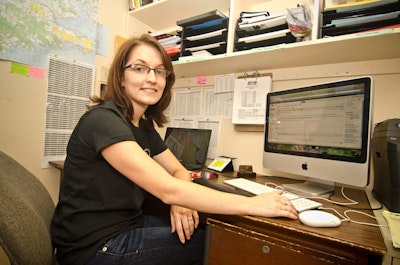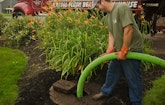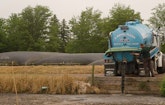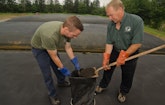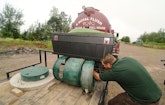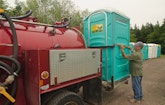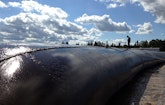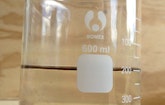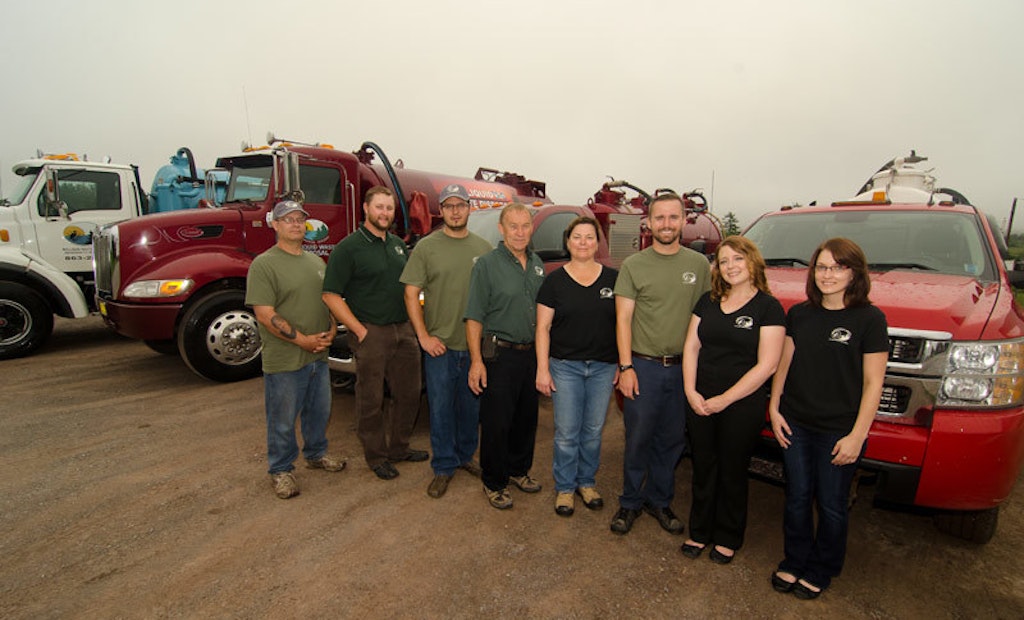
Interested in Trucks?
Get Trucks articles, news and videos right in your inbox! Sign up now.
Trucks + Get AlertsConstantly eyeing industry technology advances and government regulation of liquid waste haulers, Francis Overmars has transformed a small Canadian dairy heifer farming operation into a vital, diversified wastewater services provider.
Over the course of nearly 30 years, Overmars moved from scratching out a living in farming to a more profitable venture in Bio-Liquid Waste Disposal, Antigonish, Nova Scotia. Along the way, he’s creatively addressed challenging disposal issues and built a family operation he one day hopes to pass down to the next generation.
“I was raised on a dairy farm,” says Overmars. “When my brother took over the farm, I bought the 150-acre farm next door, where we raised 120 dairy heifers. When they reached two years of age, the heifers were returned to my brother as dairy cows.” However, Overmars found he was working long hours for minimal returns. He branched out into pumping residential septic tanks in 1987 based on a perception that the area required better septic service.
INCUBATING THE BUSINESS
Overmars’ story began with an undersized vacuum truck, which he soon replaced with a new 1,900-gallon steel tank from Husky Farm Equipment outfitted with a Jurop vacuum pump. “We started slowly, mostly pumping one or two residential tanks in the evenings for a couple of hours a day,” he says. “Three or four years later, we hired our first driver to handle the expanding business so I could keep working the farm.”
Septic tanks are emptied into the farm’s sewage lagoon, which is kept separate from animal waste. Once processed, the material is applied on the farm as fertilizer for crops to be consumed by farm animals – grasses, hay or corn, for example.
In 1992, Overmars and other septic pumpers formed the Septic Pumpers Association of Nova Scotia, which later merged with the Waste Water Nova Scotia Society. The association is devoted to improving customer service and updating members on the latest industry technologies and techniques.
“It’s a heavily regulated industry,” notes Overmars. “Membership gives you a voice in helping to influence those regulations.”
That same year, the business expanded to include portable restroom rentals, offering four used units from PolyJohn Canada. Today, the company offers 150 PolyJohn restrooms, including four white wedding units, an Ultralav II wedding trailer from Wells Cargo, and a brand new Explorer II trailer from McKee Technologies, purchased at the 2014 Pumper and Cleaner Environmental Expo International.
BUILDING THE FLEET
Company growth prompted an expansion of the service fleet. In 1997, the company sold its original truck and bought a used, single-axle 1995 International with a 2,500-gallon steel tank and Wallenstein pump (Elmira Machine Industries) built out by Vacutrux, the company’s provider of tanks from that point on. In 2003, Overmars purchased a 1999 tandem axle Sterling, featuring a 4,000-gallon steel tank and 120-gallon polyethylene freshwater tank and Fruitland Manufacturing pump. The vehicle is still in use today.
“In 2006, we bought a new chassis from Peterbilt and outfitted it with the 2,500-gallon tank and pump from the 1995 International, which we converted to a dump truck,” says Overmars.
More recent acquisitions include a 2008 Sterling Bullet with a Wallenstein pump and a three-compartment (720-gallon waste/dual 150-gallon freshwater) steel tank. The freshwater compartments are front and rear, with the waste tank in the center.
“We like this tank design, because we found that with just one freshwater compartment, you started your morning with a full load of water in front that dwindled as the waste increased, so the load wasn’t well balanced for most of the day,” he says. “Keeping the waste compartment in the middle between the front and rear axles makes for better weight distribution as we maintain balance in the front and rear freshwater compartments.”
In winter, the rear freshwater tank is filled with brine for recharging portable restrooms in freezing temperatures.
The newest vehicle is a 2009 Chevy Silverado 3/4-ton pickup. It’s paired with a slide-in steel 300-gallon waste/150-gallon freshwater tank and Wallenstein pump.
The trucks pull three portable restroom transport trailers: a 12-unit carrier from McKee Technologies, and two built in-house, one with room for six units and another for 10. Two Kubota mini-excavators round out the fleet: a U35 and a KX121.
PHASING OUT HEIFERS
Overmars phased out his dairy heifer operation three years ago. “Farming was 80 percent of the work and none of the profits, and my knees were wearing out,” he explains. “All that’s left of farming is growing crops.”
Today, Bio-Liquid Waste Disposal employs five people: Bailey Hayne works in the office, while Troy Miles and Andy LeDrew perform field duty. Francis’ son Mark, 28, recently returned from Halifax with his family to join the business.
The company covers a service area of about a 65-mile radius from Antigonish. Revenue for the business is split almost evenly between septic and other pumping work and portable sanitation. Aside from traditional septic service, the company offers septic inspections, cleans catch basins and grease traps, and rents out graywater tanks.
Portable sanitation work includes year-round construction and road-building, weddings and area summer events, such as the Evolve music festival, the Stan Rogers Folk Festival and races at the local James River International Speedway. Overmars is looking to buy at least one additional wedding trailer to meet the demand from discerning special-event customers.
“We really like the ease of setup, versus delivering and setting up four separate restroom units,” he says. “And with white plastic, it’s often very difficult to keep them free of handprints and dirt.”
PROMOTING THE SEPTIC SIDE
Overmars is working hard to promote and expand the septic side of the business. One service advertised prominently to homeowners is installation of septic tank risers and lids, which are provided by Tuf-Tite Inc. Customers benefit from this service, saving the cost of digging out tank lids moving forward and pumpers also appreciate the easier tank access.
“That’s where the mini-excavators are useful,” says Overmars. “A lot of the septic tanks have 3 feet of soil on top of them, so we try to convince customers that it’s more convenient both for them and for us to install risers than to dig up their property each time.”
The company maintains an on-site welding and repair facility for trucks and equipment.
“We don’t take engines apart, but we grease, oil, paint and do general repairs,” says Overmars. “Having the shop is as much about keeping the guys busy so we can keep our trained staff employed all year.”
Septage land application regulations have been tightening, an issue that Overmars has to stay out in front of. Provincial rules require companies that land-apply to organize a meeting in the community each year, seeking consensus prior to applying for a permit.
“We make sure that the premises are as presentable as possible,” says Overmars. “We don’t want to give anyone an issue regarding the permit. The whole farm is neat and organized and we even mow around the sewage lagoons. Some community members are shocked at how well we maintain the acreage.”
SLUDGE TO FERTILIZER
In a dewatering process, Overmars creates a Class B compost fertilizer product that he hopes will continue to meet with community approval. He uses geotextile dewatering tubes supplied in Canada by Syn-Tex of Winnipeg, Manitoba, and Terratube of Saint-Romuald, Quebec, for the job. The tubes are 45 feet in diameter and 80 feet long.
“We empty the lagoons into the dewatering bags in October when the weather cools down,” he says. “We fill them to 7 feet high and add a polymer chemical and by the next day they’ve reduced to 16 inches of sludge. We continue to refill them as they dewater, over about three years. Once the bags are full, we split them open and the result is dewatered sludge, suitable for spreading.”
Nova Scotia wastewater treatment plants won’t accept sewage from pumpers, largely because of its highly concentrated nature and the presence of aerobic bacteria, which may conflict with anaerobic sewage treatments. Overmars hopes to offer the dewatering service to other customers looking for a more efficient way to dispose of waste.
“We’ve done some dewatering for the town of Antigonish, and have had several pumping companies in our business express interest in it,” he says. “We supply the bag and quipment. Everything fits conveniently into a cargo trailer, which makes things portable and easy to transport.”
MONITORING NEW TECHNOLOGY
Overmars attends the Water and Wastewater Equipment, Treatment and Transport (WWETT) show (formerly the Pumper & Cleaner Expo) whenever he can, as much to keep on top of new industry technologies as to network with other professionals.
“When you run into someone who has already solved a problem you’re facing and leave with some new revenue-generating ideas, it’s a good investment,” he says.
Mark and his wife Maureen both attended the Expo in 2014. Being new to the industry, they say they both benefitted greatly from the networking opportunities.
“Prior to attending the show, almost all of my knowledge of the industry has come from working with our business exclusively,” Mark says. “After meeting new people in the same industry and understanding how they approach similar challenges, it has really broadened my perspective. I hope to go again next year.”
With his son now on board, Overmars is gradually formulating a succession plan for the business.
“He’s only been with us for part of a year, but it’s something we’re now working toward,” says the elder Overmars.
MORE INFORMATION
Elmira Machine Industries/Wallenstein Vacuum - 800/801-6663 - www.wallenstein.com
Fruitland Manufacturing - 800/663-9003 - www.fruitlandmanufacturing.com
Husky Farm Equipment - 519/846-5329 - www.huskyfarm.ca
Jurop - www.jurop.it/eng
Kubota Tractor Corporation - 310/370-3370 - www.kubota.com
McKee Technologies
Explorer Trailers - 866/457-4525 - www.explorertrailers.com
PolyJohn Canada - 800/465-9590 - www.polyjohncanada.com
Syn-Tex, an ITW Company - 800/677-024 - www.syntexgeo.com
Tuf-Tite, Inc. - 800/382-7009 - www.tuf-tite.com
Vacutrux Limited - 800/305-4305 - www.vacutrux.com
Wells Cargo, UltraLav - 877/301-3837 - www.ultralav.com
